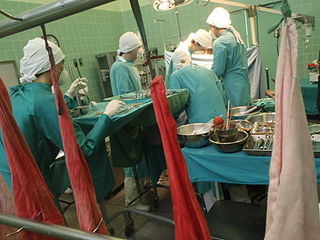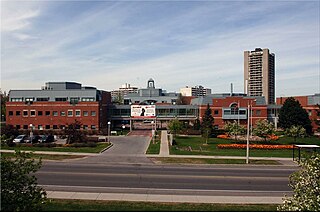
Organ donation is the process when a person allows an organ of their own to be removed and transplanted to another person, legally, either by consent while the donor is alive or dead with the assent of the next of kin.

Organ transplantation is a medical procedure in which an organ is removed from one body and placed in the body of a recipient, to replace a damaged or missing organ. The donor and recipient may be at the same location, or organs may be transported from a donor site to another location. Organs and/or tissues that are transplanted within the same person's body are called autografts. Transplants that are recently performed between two subjects of the same species are called allografts. Allografts can either be from a living or cadaveric source.
The Uniform Anatomical Gift Act (UAGA), and its periodic revisions, is one of the Uniform Acts drafted by the National Conference of Commissioners on Uniform State Laws (NCCUSL), also known as the Uniform Law Commission (ULC), in the United States with the intention of harmonizing state laws between the states.

Canadian Blood Services is a non-profit charitable organization that is independent from the Canadian government. The Canadian Blood Services was established as Canada's blood authority in all provinces and territories except for Quebec in 1998. The federal, provincial and territorial governments created the Canadian Blood Services through a memorandum of understanding. Canadian Blood Services is funded mainly through the provincial and territorial governments.
Eye banks recover, prepare and deliver donated eyes for cornea transplants and research. The first successful cornea transplant was performed in 1905 and the first eye bank was founded in 1944. Currently, in the United States, eye banks provide tissue for over 80,000 cornea transplants each year to treat conditions such as keratoconus and corneal scarring. In some cases, the white of the eye (sclera) is used to surgically repair recipient eyes. Unlike other organs and tissues, there is an adequate supply of corneas for transplants in the United States, and excess tissue is exported internationally, where there are shortages in many countries, due to greater demand and a less-developed eye banking infrastructure.

Body donation, anatomical donation, or body bequest is the donation of a whole body after death for research and education. Donated bodies are mostly used for medical education and research. They are used for gross anatomy, surgical anatomy and for furthering medical education. For years, only medical schools accepted bodies for donation, but now private programs also accept donors. Depending on the program's need for body donation, some programs accept donors with different specifications.
The Australian Organ Donor Register (AODR) is a government register, recording individuals who have agreed to donate organs and tissues in the event of their death. The register is operated by the Organ and Tissue Authority (OTA) and Services Australia through Medicare.
The United Network for Organ Sharing (UNOS) is a non-profit, scientific and educational organization that administers the only Organ Procurement and Transplantation Network (OPTN) in the United States, established by the U.S. Congress in 1984 by Gene A. Pierce, founder of United Network for Organ Sharing. Located in Richmond, Virginia, the organization's headquarters are situated near the intersection of Interstate 95 and Interstate 64 in the Virginia BioTechnology Research Park.
The National Marrow Donor Program (NMDP) is a nonprofit organization founded in 1986 and based in Minneapolis, Minnesota, that operates the Be The Match Registry of volunteer hematopoietic cell donors and umbilical cord blood units in the United States.
On October 19, 1984, the Congress of the United States approved the National Organ Transplant Act (NOTA). It not only established the framework for the U.S. organ transplant system but has served as a model for development of other transplant networks worldwide. Through the establishment of a national Organ Procurement and Transplantation Network (OPTN), the law directed that organ allocation would be managed on a national basis and be developed through a unique public-private partnership. Since the initial network contract was finalized in 1986, United Network for Organ Sharing (UNOS) has served as the OPTN under contract with the U.S. Department of Health and Human Services. OPTN policies are developed by a broad community that includes donation and transplant clinicians and professionals, as well as people personally touched by the donation and transplant experience. NOTA and subsequent federal regulation call on the OPTN to emphasize fair and equitable patient access to transplantation, as well as reliance on objective medical evidence and adaptability to rapid evolution in clinical treatment and scientific understanding. Many of the OPTN’s responsibilities, priorities and policies have changed over the years. Yet the lifesaving gift organ donation, and the continuing need of candidates awaiting a transplant, remain the same today as they did 30 years ago. To fulfill the ultimate goals of NOTA, we must continue to ensure that the national transplant network allocates organs efficiently and fairly. We must also build public knowledge and trust in organ donation to help increase transplant opportunities for everyone in need.

The National Organization for Organ and Tissue Donation and Transplant (NOD-Lb) is a Lebanese non-profit organization affiliated to the Lebanese Ministry of Public Health. NOD-Lb was created by a joint venture between the Ministry of Public Health and the Lebanese Order of Physicians in Beirut.

The Gift of Life Marrow Registry is a public bone marrow and blood stem cell registry headquartered in Boca Raton, Florida. Gift of Life facilitates transplants for children and adults suffering from life-threatening illnesses, including leukemia, lymphoma, other cancers and genetic diseases.
The Ontario Online Donor Registry is a website where Ontario residents, age 16 and older, can register their consent to be an organ and tissue donor. This registry was created to help ease questions and ambiguities with organ donor wishes. The virtual registry also increases Ontario donations with increased accessibility. The registration process can be done through beadonor.ca. Online donor registries have also become popular in the United States, where one can register through Donate Life America; Malaysia, registering through their National Transplant Registry; and Saudi Arabia, registering through the Saudi Center for Organ Transplantation.
In the United States, an organ procurement organization (OPO) is a non-profit organization that is responsible for the evaluation and procurement of deceased-donor organs for organ transplantation. There are 58 such organizations in the United States, each responsible for organ procurement in a specific region, and each a member of the Organ Procurement and Transplantation Network (OPTN), a federally mandated network created by and overseen by the United Network for Organ Sharing (UNOS). The individual OPOs represent the front-line of organ procurement, having direct contact with the hospital and the family of the recently deceased donor. Once the OPO receives the consent of the decedent's family, it works with UNOS to identify the best candidates for the available organs, and coordinates with the surgical team for each organ recipient.

MOHAN Foundation is a not-for-profit, registered non-government charity organisation in India that works in the field of deceased organ donation and transplantation. MOHAN is an acronym for Multi Organ Harvesting Aid Network. It has offices in Chennai, Hyderabad, Bengaluru, Delhi, Mumbai, Chandigarh, Nagpur, Jaipur and information centers at Kerala and Imphal.
Organ donation is when a person gives their organs after they die to someone in need of new organs. Transplantation is the process of transplanting the organs donated into another person. This process extends the life expectancy of a person suffering from organ failure. Unfortunately the number of patients requiring organ transplants outweighs the number of donor organs available.
Kidney Paired Donation (KPD) or Paired Exchange, is an approach to living donor kidney transplantation where patients with incompatible donors swap kidneys to receive a compatible kidney. KPD is used in situations where a potential donor is incompatible. Because better donor HLA and age matching are correlated with lower lifetime mortality and longer lasting kidney transplants, many compatible pairs are also participating in swaps to find better matched kidneys. In the United States, the National Kidney Registry organizes the majority of U.S. KPD transplants, including the largest swaps. Swaps involving more than two recipients are termed a kidney chain. The first large swap was a 60 participant chain in 2012 that appeared on the front page of the New York Times and the second, even larger swap, included 70 participants and was completed in 2014. Other KPD programs in the U.S. include the UNOS program which was launched in 2010 and completed its 100th KPD transplant in 2014 and the Alliance for Paired Donation.
BC Transplant Society (BCTS) founded in 1985 is now an agency of Provincial Health Services Authority (PHSA) in the Canadian province of British Columbia that registers consent to be donors of organs for Organ transplantation.
Organ transplantation in the Indian state of Tamil Nadu is regulated by India's Transplantation of Human Organs Act, 1994 and is facilitated by the Transplant Authority of Tamil Nadu (TRANSTAN) of the Government of Tamil Nadu and several NGOs. Tamil Nadu ranks first in India in deceased organ donation rate at 1.8 per million population, which is seven times higher than the national average.

The Youth Coalition for Organ Donation is a multinational nonpartisan. NY-based 501(c)(4) lobbying group formed with the goal of increasing the number of organ donations in the US. The YCOD promotes organ donation through various online campaigns, including social media messaging, news appearances, and public lobbying campaigns.








